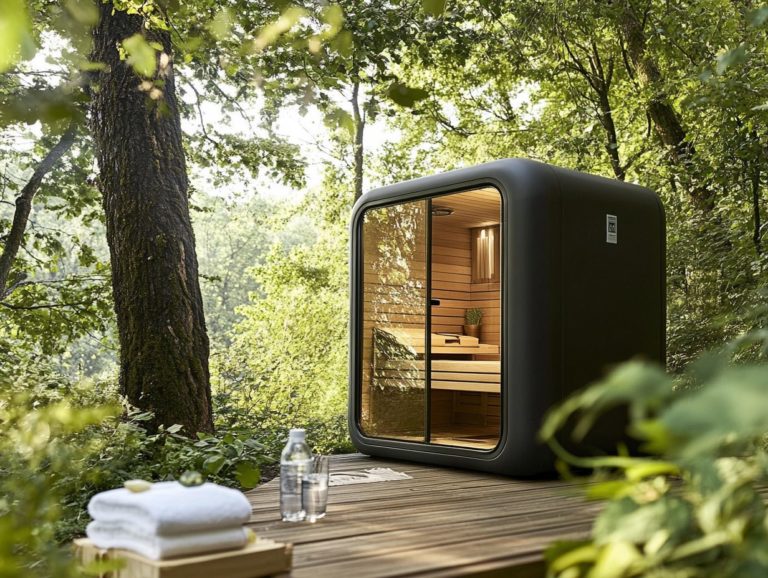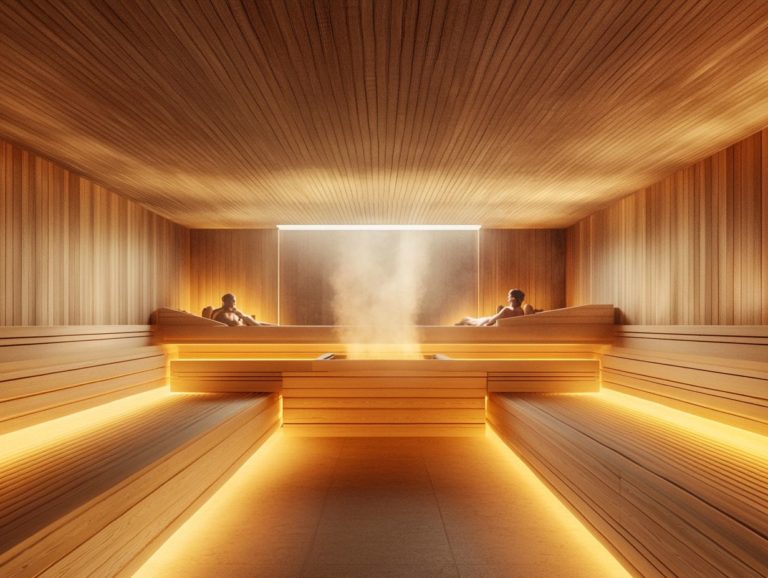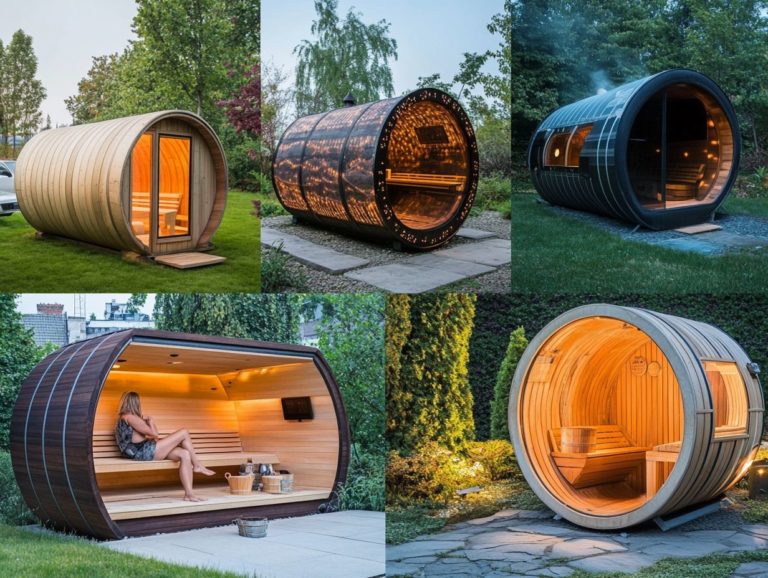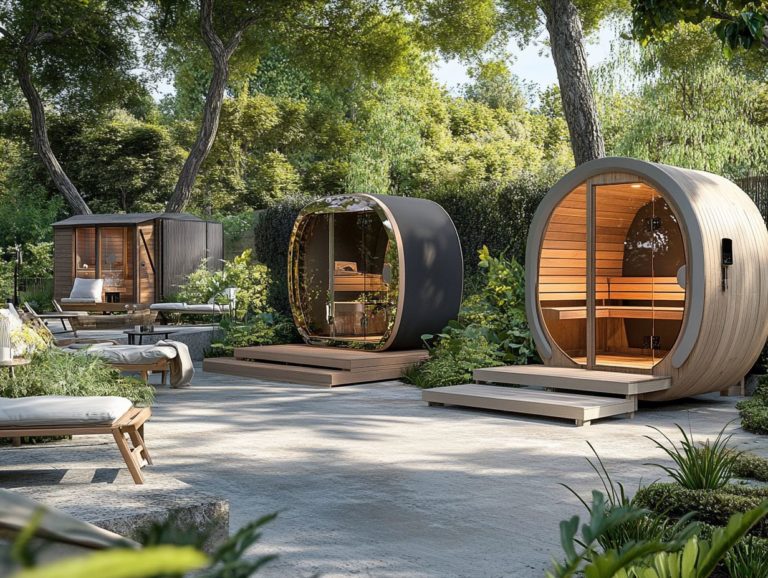Understanding the Different Sauna Heaters
Choosing the right sauna heater can greatly enhance your relaxation journey. You have options like electric, wood-burning, and infrared heaters. It’s important to understand how each operates and the benefits they offer.
This guide explores the types of sauna heaters available. It also highlights key factors to consider, ensuring you find the right match for your needs.
Ready to elevate your sauna experience? Let’s dive in!
Contents
- Key Takeaways:
- Types of Sauna Heaters
- Factors to Consider When Choosing a Sauna Heater
- Benefits of Different Sauna Heaters
- How to Decide on the Best Sauna Heater for You
- Frequently Asked Questions
- What are the different types of sauna heaters and how do they cater to different sauna users?
- How do electric sauna heaters work?
- What are the benefits of using a wood-burning sauna heater?
- Are gas sauna heaters safe to use?
- What is the difference between an infrared sauna heater and a traditional sauna heater?
- Do I need a separate room for a steam sauna heater?
Key Takeaways:
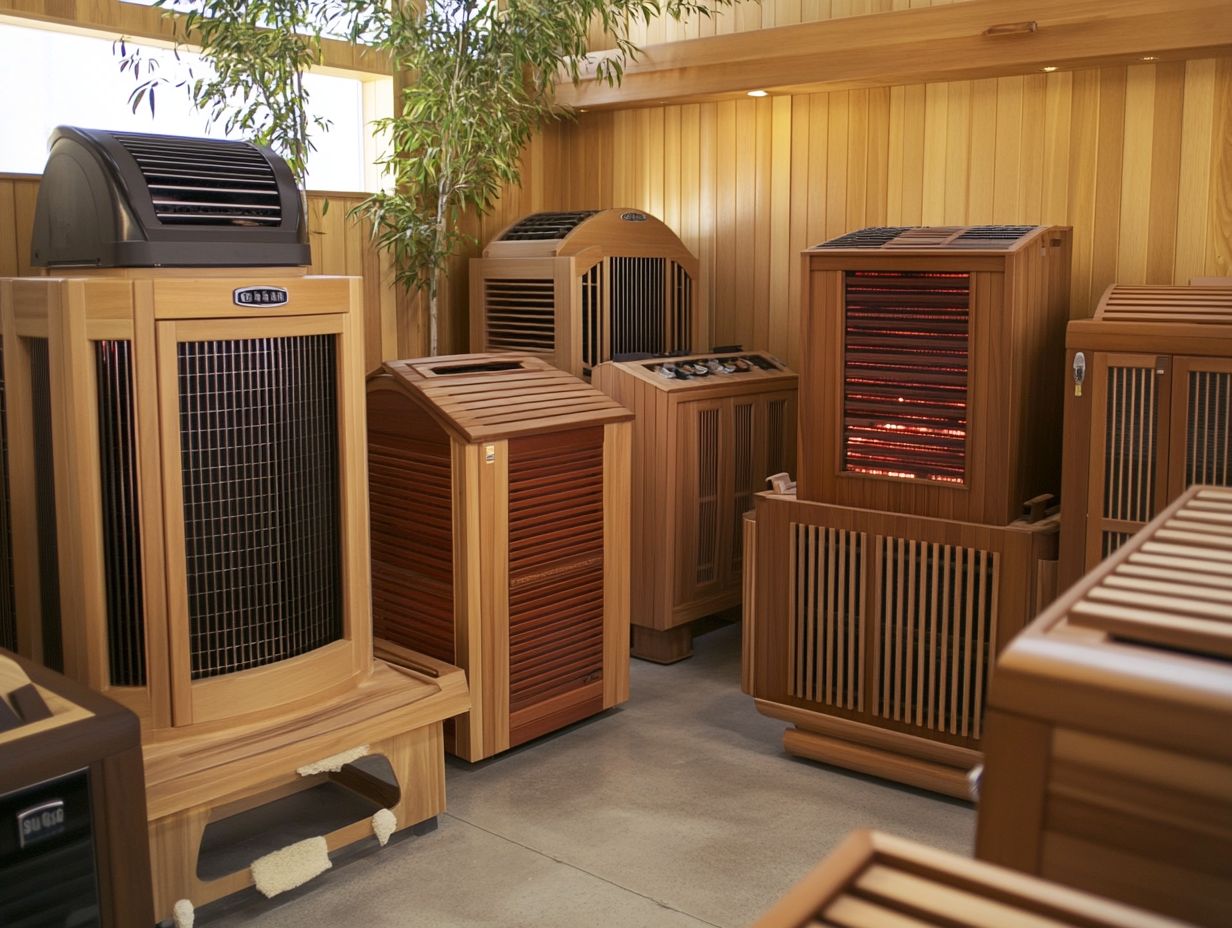
- Explore the different types of sauna heaters: electric, wood-burning, and infrared. Each has unique features and benefits.
- Consider size, energy efficiency, and maintenance when choosing a sauna heater. These factors impact your overall experience and costs.
- Understand the health benefits and cost factors of each type. This will help you make an informed decision based on your budget.
What is a Sauna Heater?
A sauna heater is essential for delivering warmth in your sauna. It promotes relaxation and offers benefits like detoxification, which is the process of removing toxins from your body, and calorie burning.
Electric sauna heaters are popular for their user-friendly controls and consistent heating. They are perfect for those who want a dependable sauna experience.
Wood-burning heaters bring a traditional charm, filling the air with the smell of burning wood. Meanwhile, gas heaters warm the sauna quickly.
Infrared heaters work differently; they emit heat directly to your body, making them great for shorter sessions at lower temperatures. Many users find that shorter, frequent visits yield better results.
Temperature preferences vary, usually between 150 F to 195 F, depending on comfort levels. Regular maintenance, like cleaning and inspections, is crucial for optimal performance.
Types of Sauna Heaters
There is a wide variety of sauna heaters, each using different methods to deliver warmth. Traditional wood-burning sauna heaters create a rustic atmosphere.
Modern electric sauna heaters offer unmatched convenience and ease of use. Gas and infrared heaters cater to specific preferences with distinct features.
Electric Heaters
Electric sauna heaters stand out for their convenience and efficiency. They quickly reach your desired temperature, allowing shorter sessions while maximizing health benefits.
What sets electric models apart is their easy installation. They often require less effort than traditional wood-burning models.
Electric heaters are energy-efficient, which helps lower costs over time especially with high-efficiency models. They provide peace of mind with no open flames, making them safe for families.
Brands like Harvia and Finnleo offer a range of options with innovative technology and easy controls. They combine the versatility of gas heaters without the emissions.
Wood-Burning Heaters
Wood-burning sauna heaters offer a distinctive and authentic sauna experience. They craft a cozy ambiance that true sauna enthusiasts deeply appreciate.
With this type of heater, you’ll need a proper wood sauna heater setup and sauna rocks. These not only contribute to the natural atmosphere but also help maintain a consistent temperature throughout your session.
Beyond the inviting aroma that fills the space, these heaters hold heat exceptionally well. Unlike electric models, wood-burning options give off warmth better, allowing you to enjoy a longer, more relaxing experience.
As you contemplate becoming a proud owner, consider essential factors like proper installation requirements and ongoing maintenance. These are necessary to keep the system operating smoothly.
The craftsmanship of various wood-burning models can differ significantly, influencing both their aesthetics and performance. Costs can also vary based on the quality and features of the heater you select.
Investing in a wood-burning sauna heater will transform your sauna experience into something truly special! It merges tradition with efficiency and comfort.
Infrared Heaters
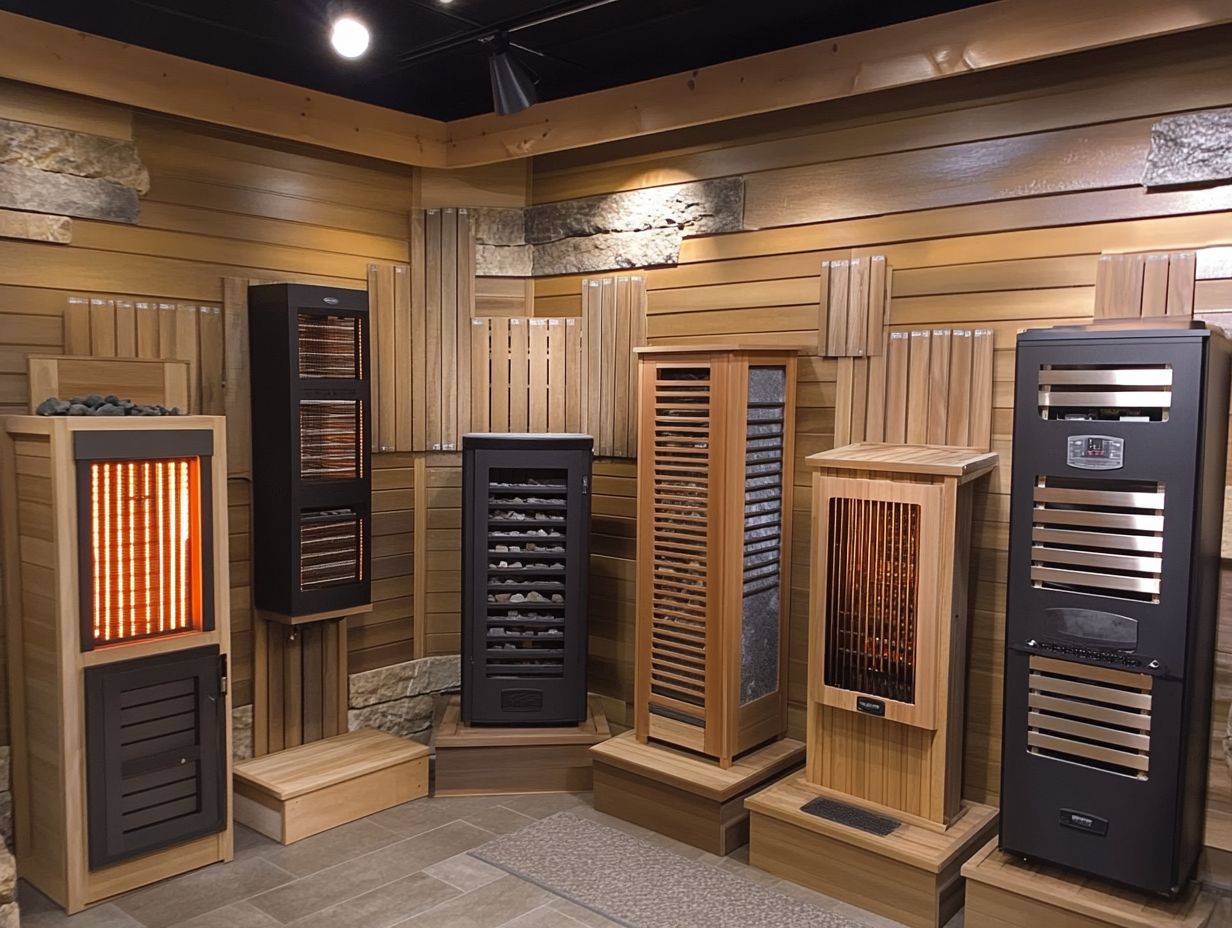
Infrared sauna heaters harness cutting-edge technology to emit infrared light. This delivers a unique health experience that focuses on detoxification and relaxation.
Unlike traditional heaters, these infrared models warm your body directly rather than just the surrounding air, making them a favorite for those who prefer gentler sauna temperatures.
This distinct heating method has been shown to significantly enhance circulation. The gentle warmth encourages blood flow and oxygen delivery throughout your body.
Many users report improved muscle relaxation after their sessions, which can be especially beneficial for athletes or anyone dealing with tension. You ll find that sessions often last longer than those in conventional saunas, thanks to the more comfortable temperatures.
It’s common to enjoy extended stays of 30 to 45 minutes. While personal preferences will vary, the general consensus is that the soothing heat combined with a tranquil environment creates a more enjoyable and restorative experience for everyone.
Factors to Consider When Choosing a Sauna Heater
When choosing a sauna heater, you ll want to consider several key factors that can significantly enhance your sauna experience. The size and capacity of the heater, energy efficiency, and installation requirements all play crucial roles.
It’s important to recognize your personal preferences and budget constraints. These will guide you in making informed decisions that align perfectly with the sauna atmosphere you envision.
Size and Capacity
The size and capacity of a sauna heater are pivotal considerations that can significantly influence your overall sauna experience. Different heater capacities are tailored for various sauna sizes and the number of users.
For instance, if you have a cozy sauna measuring about 4 to 6 square meters, you’ll typically need a heater with a capacity between 3 to 6 kilowatts.
Conversely, if your sauna spans around 8 to 12 square meters, a heater rated between 6 to 9 kilowatts would suit you better.
Keep in mind that factors like insulation and your desired temperature also play a role in these recommendations. Achieving the right balance in heater capacity helps you reach a comfortable temperature quickly while keeping it steady throughout your sauna experience.
This allows you to relax and unwind without the hassle of constant adjustments.
Ready to find your perfect sauna heater? Let s dive in!
Energy Efficiency
Energy efficiency plays a crucial role when selecting a sauna heater. It directly impacts your long-term costs and sustainability. Different types of sauna heaters come with varying levels of energy efficiency, which influences your initial investment and ongoing maintenance expenses.
Understanding energy ratings is key. These ratings reveal which heaters will help you save the most on energy bills over time. For example, electric heaters typically boast high efficiency, converting nearly all electrical energy into heat. In contrast, gas heaters might present lower operational costs if you live in an area where gas is reasonably priced.
Wood-burning heaters can be a mixed bag; their efficiency varies depending on the type of wood you use, leading to fluctuations in your operational costs. Infrared sauna heaters are another attractive option. They are known for their ability to heat the body directly while operating at a lower energy consumption rate perfect for those looking to keep their expenses in check.
By carefully evaluating these factors, you can make a well-informed choice that aligns with your budget and environmental goals.
Installation and Maintenance
Proper installation and maintenance of a sauna heater are crucial for ensuring its performance and longevity. This ultimately shapes your entire sauna experience. Whether you decide to hire a gas plumber for gas sauna heaters or consult an HVAC (Heating, Ventilation, and Air Conditioning) technician for electric units, understanding the installation costs and maintenance requirements is essential.
For gas sauna heaters, installation may involve additional plumbing and ventilation considerations. These can lead to costs that exceed your initial expectations. Electric sauna heaters usually require a dedicated circuit and possibly a larger breaker, which can also increase installation expenses.
As you navigate these options, don t forget about potential challenges like local building codes or permits that may impact the installation process. Once everything is set up, regularly checking electrical connections and cleaning the heater can significantly extend its lifespan and ensure safe, efficient operations. Routine maintenance is a critical part of sauna ownership.
Benefits of Different Sauna Heaters
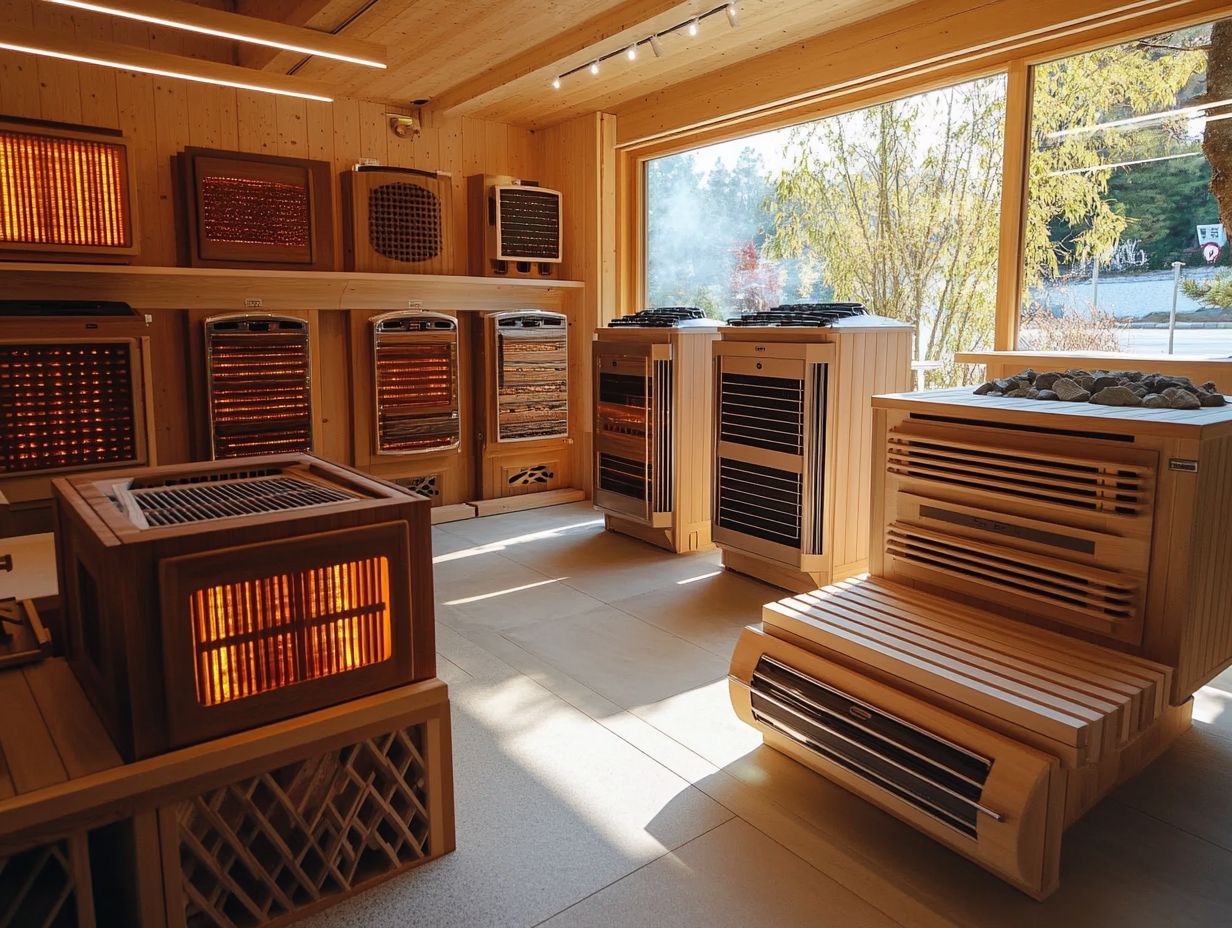
Each sauna heater offers unique benefits that can truly enhance your experience! They are tailored to various preferences, especially regarding health benefits, cost, and convenience. By grasping these differences, you can make an informed decision on which heater type best suits your needs, ultimately elevating your sauna experience to new heights.
Health Benefits
Sauna heaters are essential in unlocking numerous health benefits, offering you opportunities for detoxification, relaxation, and improved circulation. Understanding how different types of sauna heaters contribute to these benefits will guide you in selecting the ideal option for your wellness routine.
Among the three primary heater options electric, wood-burning, and infrared each presents unique advantages that can significantly elevate your sauna experience. Electric heaters, for instance, are celebrated for being easy to use and providing consistent heat output, making them a favorite for those seeking quick and effective relaxation.
Wood-burning heaters immerse you in a traditional sauna ambiance, often praised for delivering a deeper, more soothing experience that many find profoundly comforting. Meanwhile, infrared sauna heaters emit radiant heat that penetrates the skin more deeply, earning accolades for their associations with enhanced detoxification and pain relief.
Research indicates that regular use of infrared saunas can boost metabolism and contribute to overall well-being. This makes them a compelling choice for anyone eager to weave sauna therapy into their health regimen. Don t miss out on the unique health benefits these heaters provide!
Explore your options today and elevate your sauna experience!
Cost and Convenience
The cost and convenience of various sauna heaters are pivotal in your decision-making process. They impact both your initial investment and ongoing expenses.
Electric sauna heaters often have a more budget-friendly installation while providing better performance. In contrast, wood-burning options might require more effort, but they create a unique ambiance that many find irresistible.
Gas heaters provide a balanced option with moderate costs, delivering quicker heating times. Infrared heaters are popular for their energy-efficient operation, using less power and typically resulting in lower utility bills.
When it comes to convenience, electric and infrared models truly shine. They often require minimal maintenance and have easy-to-use controls that significantly enhance your sauna experience. Many consumers weigh these factors carefully, considering the long-term benefits of reduced upkeep against the charm of traditional wood-burning saunas.
Summary: Electric heaters offer low installation costs and ease of use, while wood-burning models add charm. Gas heaters balance costs and heating speed, and infrared options save energy and lower bills.
How to Decide on the Best Sauna Heater for You
When selecting the ideal sauna heater, consider your personal preferences, budget, and the sauna experience you desire. Explore the variety of options available to make informed choices that fit your lifestyle.
Personal Preferences and Budget
Personal preferences are key when choosing a sauna heater. Factors like your desired sauna temperature, session length, and the ambiance you wish to create profoundly shape your experience.
Establishing a clear budget helps narrow down your options, ensuring you find a heater that aligns with your lifestyle and enjoyment.
Understanding how various heater types meet your needs is essential. For instance, if you value convenience, electric heaters may catch your interest. If you appreciate traditional sauna charm, wood-burning options could appeal to you.
If you’re budget-conscious, consider not just the initial purchase price, but also installation and ongoing energy consumption. Researching different brands and models can unveil choices that fit your financial parameters. Explore second-hand markets or seasonal sales for substantial savings and a wider array of options.
Frequently Asked Questions
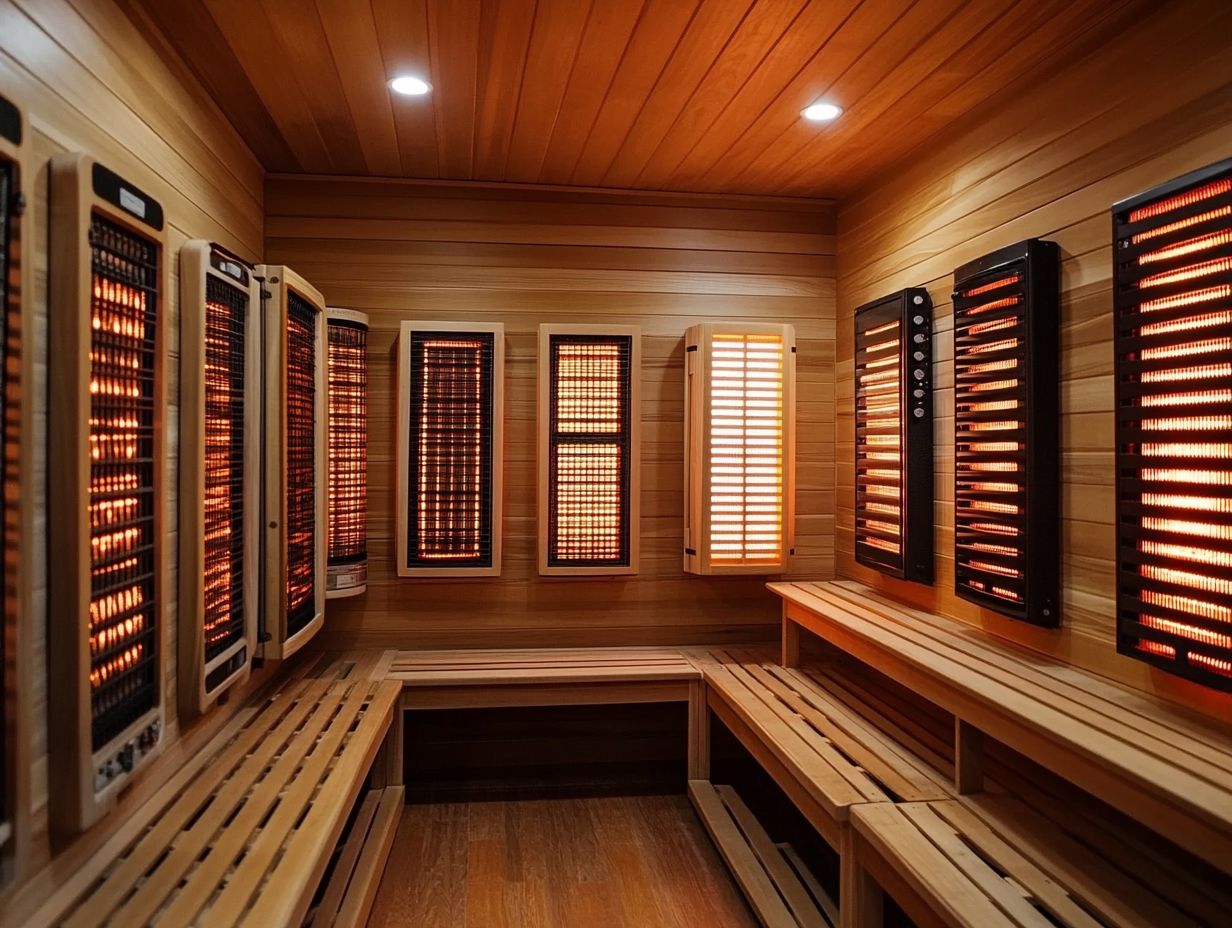
What are the different types of sauna heaters and how do they cater to different sauna users?
The different types of sauna heaters include electric, wood-burning, gas, infrared, and steam. Each type caters to different preferences and experiences.
How do electric sauna heaters work?
Electric sauna heaters use heating elements to warm rocks or ceramic stones, which then radiate heat throughout the sauna room.
What are the benefits of using a wood-burning sauna heater?
Wood-burning sauna heaters provide a traditional experience, creating an authentic and natural ambiance. They also tend to have a longer lifespan compared to other types.
Are gas sauna heaters safe to use?
Yes, gas sauna heaters are safe as long as they are properly installed and maintained. It’s crucial to have a professional install and vent the heater to prevent any safety hazards.
What is the difference between an infrared sauna heater and a traditional sauna heater?
Infrared sauna heaters use infrared light to directly heat the body, while traditional heaters warm the air in the sauna room. Infrared saunas operate at lower temperatures and can be more energy-efficient.
Do I need a separate room for a steam sauna heater?
Yes, steam sauna heaters require a separate room with proper ventilation to prevent moisture buildup. The steam is created by pouring water over heated rocks in the heater, so a designated space is necessary.
Explore your options today and find the perfect sauna heater for your needs!

